
One Step Closer to Smarter Electronic Devices, Using Voltage-Driven Ionic Control
Monday, June 23, 2025 Researchers at the University of Waterloo demonstrate an innovative way to manipulate spin properties. Smartphones that anticipate needs. Wearable technology that responds instantly to one’s body. Smart home devices that understand context more intelligently. All at a greener energy footprint and a higher efficiency rate. Yes, researchers are one […]
June 23, 2025

IQC’s logo shines bright in a diamond
IQC’s logo shines bright in a diamond Thursday, January 11, 2024 Snapshots of IQC Diamonds are one of the most sought-after and versatile gemstones in the world, with purposes beyond jewelry and drill tips. In quantum research, diamonds are frequently studied because of the presence of special defects called colour centers, which can act as […]
January 11, 2024
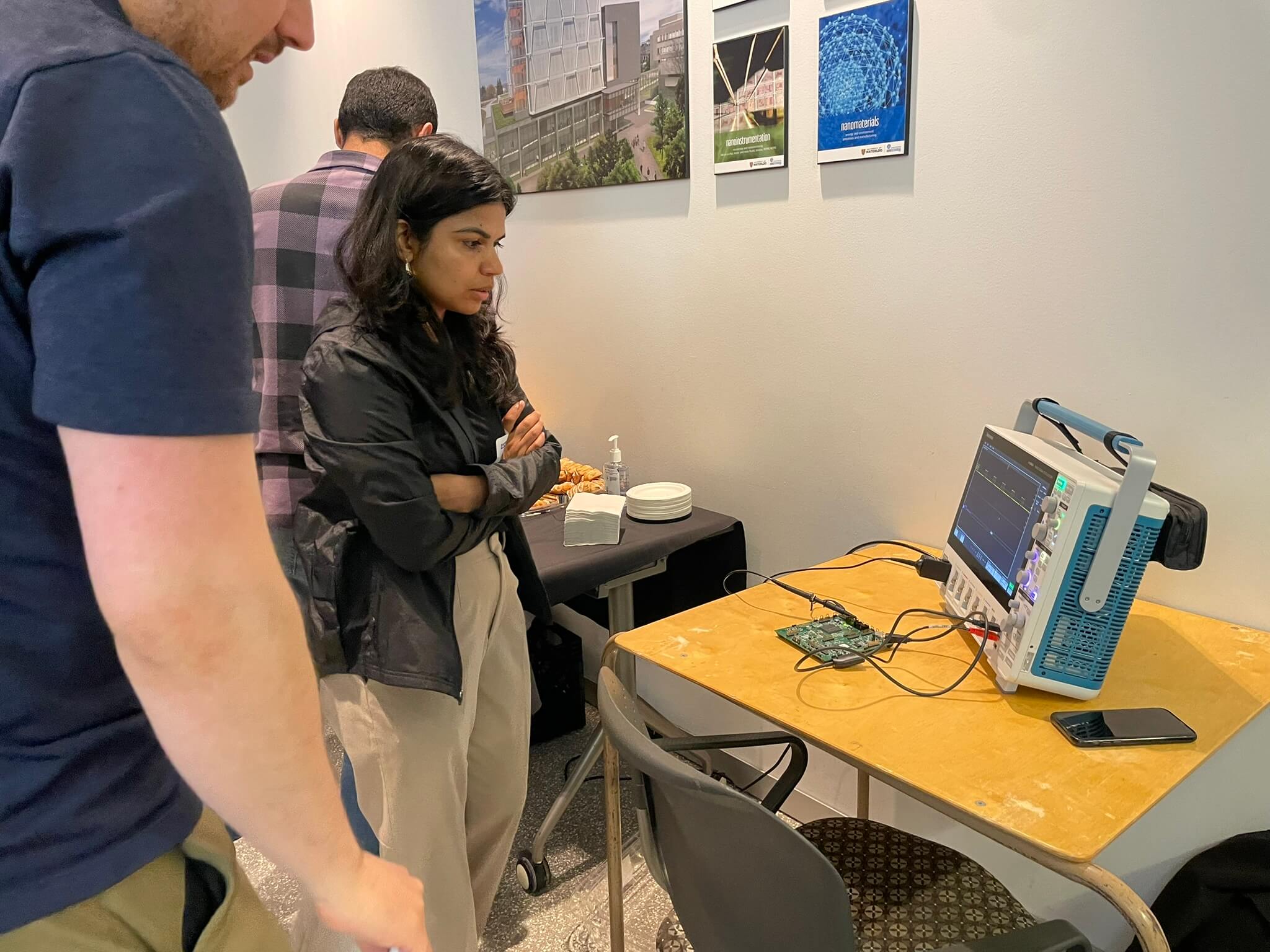
Electrical Characterization Seminar Paves a Path for Future Collaborations
Electrical Characterization Seminar Paves a Path for Future Collaborations Event held on Tuesday, May 27, 2025 On Tuesday, the Quantum-Nano Fabrication and Characterization Facility (QNFCF), Transformative Quantum Technologies (TQT), and Testforce hosted the Electrical Characterization Seminar, joined by speakers from Keithey and Tektronix. The seminar saw over 30 attendees, including students, postdoctoral fellows, and […]
May 27, 2025
Mastering Electrical Characterization Seminar
Mastering Electrical Characterization Seminar Event to be held on Tuesday, May 27, 2025, 9:00 AM – 1:00 PM, QNC 1501 The Quantum Nano Fabrication and Characterization Facility (QNFCF), Transformative Quantum Technologies (TQT) and Testforce will be hosting an Electrical Characterization Seminar joined by a Keithley Applications Engineer, who will explore the challenges and best […]
April 21, 2025
Waterloo's Quantum
Valley
QVI - Quantum Valley Investments RAC - RAC Complex IQC - Institute for Quantum Computing at the University of Waterloo QNFCF - Quantum-Nano Fabrication and Characterization Facility QVIL - Quantum Valley Ideas Lab LI - Lazaridis Institute for the Management of Technology Enterprises PI - The Perimeter Institute for Theoretical Physics





































Battling Quantum Decoherence, One Flat Band At A Time
Thursday, April 24, 2025 Researchers establish a novel way to strengthen electron correlations by controlling flat band electronic structures in Transition Metal Dichalcogenide. Quantum decoherence is often a challenge that quantum scientists seek to mitigate. When an object loses its quantum properties and starts behaving like a classical object (i.e. ordinary objects whose […]
April 24, 2025

New funding set to accelerate Canada’s quantum industry capabilities
New funding set to accelerate Canada’s quantum industry capabilities March 17, 2025 Waterloo research project gets a million dollars to improve quantum measurement tools A research project led by Institute for Quantum Computing (IQC) faculty Dr. David Cory, professor in the Department of Chemistry, has received $1 million to advance quantum metrological standards. The project […]
March 17, 2025
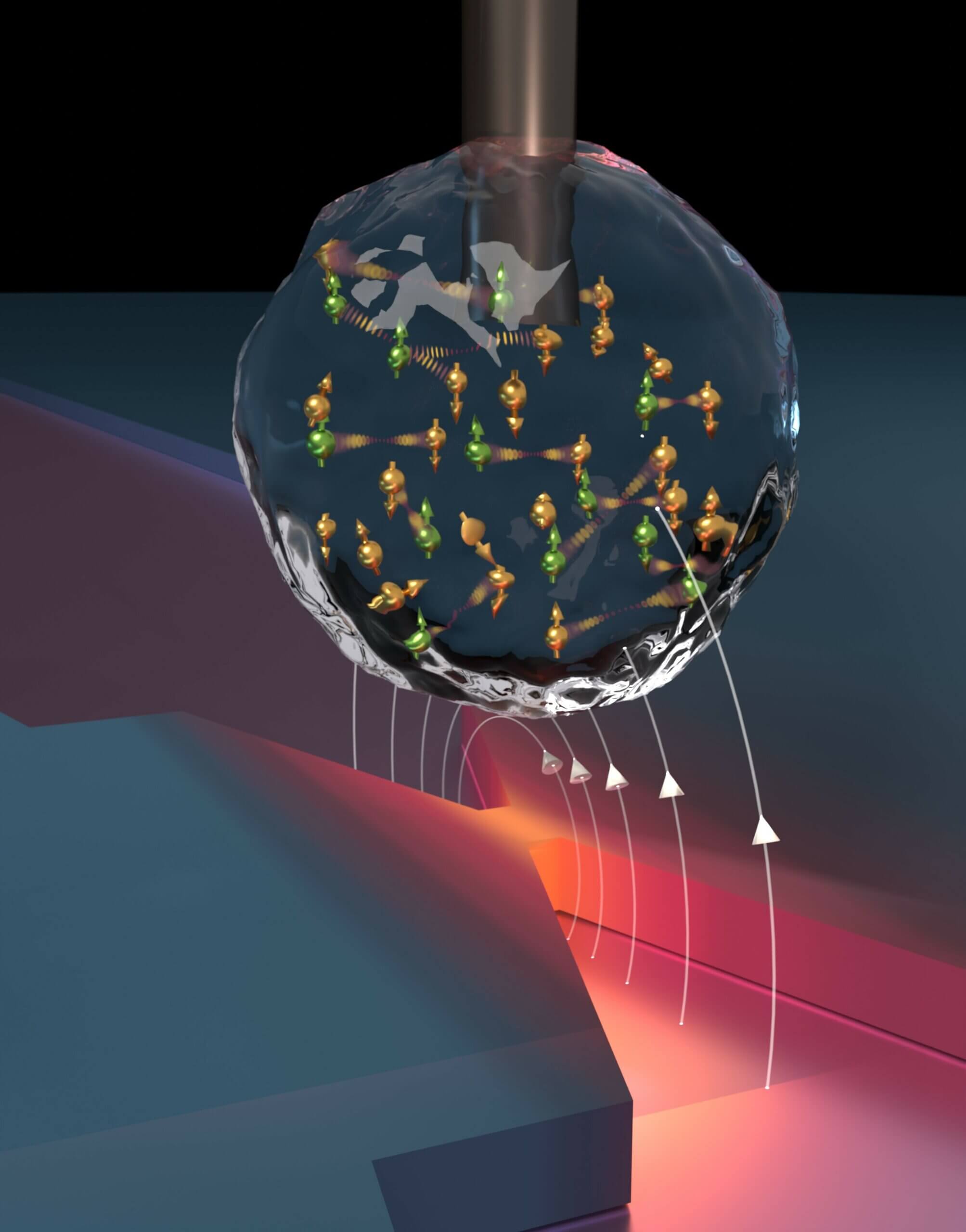
Waterloo researchers advance nanoscale imaging capabilities
Thursday, August 22, 2024 Dynamic nuclear polarization and nanometer-scale magnetic resonance imaging creates unprecedented opportunities to study biological structures Dynamic nuclear polarization (DNP) has revolutionized the field of nanoscale nuclear magnetic resonance (NMR), making it possible to study a wider range of materials, biomolecules and complex dynamic processes such as how proteins fold […]
August 22, 2024
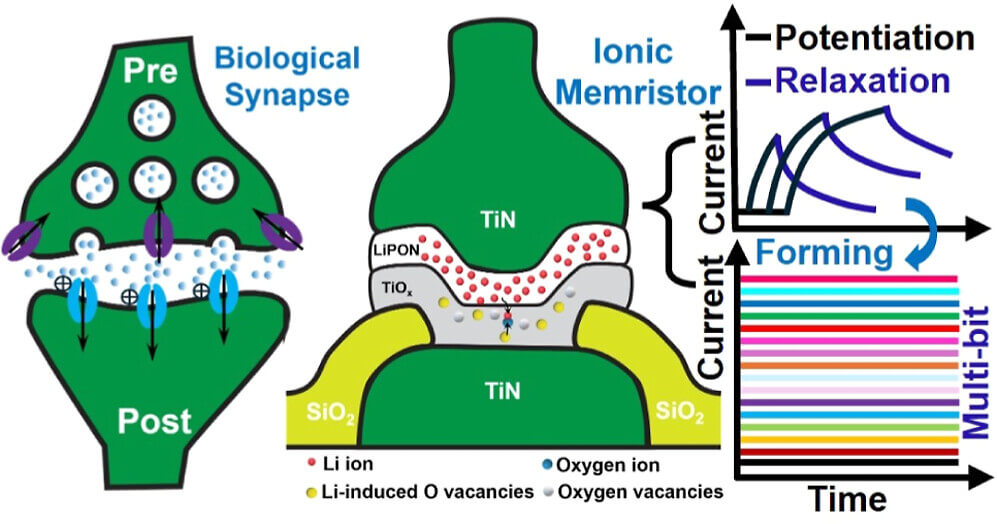
A brain-inspired iontronic platform that mimics hardware-based artificial intelligence
Wednesday, August 7, 2024 Researchers supported by Transformative Quantum Technologies (TQT) have demonstrated an iontronic platform that is configurable to mimic neuromorphic functions on a hardware level. With the rise of artificial intelligence (AI), Internet of Things (IoT), and big data technologies, coupled with the limitations posed by the von Neumann architecture, neuromorphic […]
August 7, 2024

Metasurfaces for high-efficiency parametric downconversion and complex quantum state generation
Summary Entangled photon sources are crucial for quantum computing, quantum sensing, and quantum communication. Of growing importance are sources relying on spontaneous parametric downconversion (SPDC). Unfortunately, these sources of entangled photons are often constrained by momentum conservation laws. To overcome this limitation and expand the possibility of quantum state engineering, we intend to use metasurfaces […]
February 1, 2023
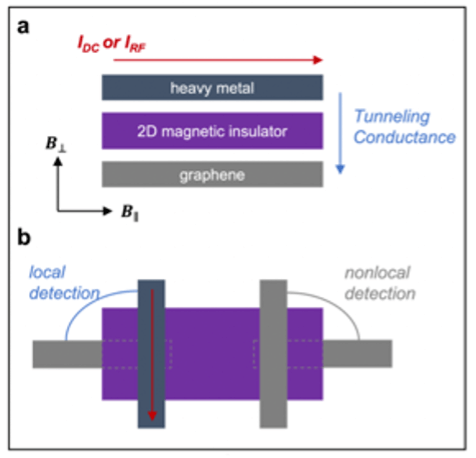
Coherent magnon generation, magnon condensation, and quantum spin liquids via spin pumping in 2D magnets
Summary Developing hybrid quantum systems is essential to harnessing the complementary advantages of different quantum technology platforms. This necessitates the successful transfer of quantum information between platforms, which can be achieved, e.g., by harnessing magnons, or spin wave excitations, in magnetic materials. Decoherence due to uncontrolled coupling of qubits to the environment remains a fundamental […]
February 1, 2023

Magnetoelectric Coupling in New Composite Multiferroic Nanostructures as High-Density Quantum Multistate Memory Elements
Summary Magnetoelectric multiferroics are materials that exhibit correlated ferroelectric and ferromagnetic properties (i.e., a magnetoelectric effect). The resulting ability of these materials to simultaneously store data in electric polarization and magnetic moment could increase data storage density and data processing speed while reducing energy consumption. This project aims to design and fabricate new composite multiferroic […]
February 1, 2023
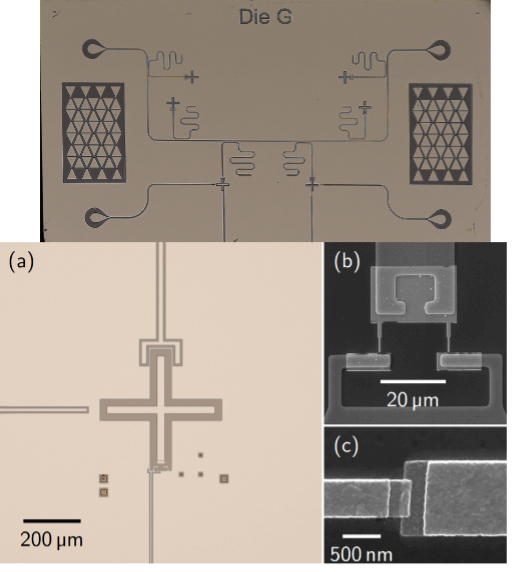
Building Blocks for Quantum Neuromorphic Computing: Superconducting Quantum Memcapacitors
Quantum neuromorphic computing (QNC) is a novel method that combines quantum computing with brain-inspired neuromorphic computing. Neuromorphic computing performs computations using a complex ensemble of artificial neurons and synapses (i.e., electrical circuits) to emulate the human brain. QNC may lead to a quantum advantage by realizing these components with quantum memory elements, or memelements, which […]
June 12, 2023

Enabling Next-Generation Sustainable Computing through Novel Multi-Valued-Logic Quantum Devices
As the demand for digital services grows, so does the need for data centres and transmission networks. Unfortunately, these data systems consume vast amounts of energy, resulting in nearly 1% of all energy-related greenhouse gas emissions. This project aims to invent novel quantum devices for highly energy-efficient computing that may help reduce the global digital […]
June 12, 2023
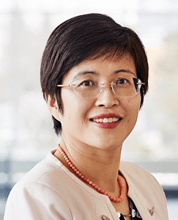
Micro-Supercapacitors Based on Termination Optimized MXene Quantum Dots with Ultra-High Rate Capability and Fast Frequency Response
Micro-supercapacitors (MCs) are miniaturized energy storage devices that can enhance the performance of wearable health devices, medical implants, wireless sensors, and micro-electromechanical systems due to their fast frequency response, long life cycle, and vast temperature operation. However, to make these MC systems into commercially feasible products, necessary improvements to current MC performance are necessary, primarily […]
June 12, 2023
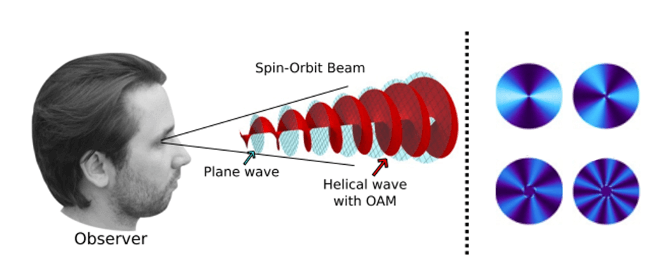
Structured Light Applications in Vision Science
Eye diseases such as macular degeneration can have a devastating impact on quality of life. Early detection and treatment are thus crucial for preventing irreversible vision loss. A previous study found that the human eye can detect differences in ‘structured’ light beams. Such light beams are composed of a coherent superposition of differently polarized planar […]
April 24, 2023
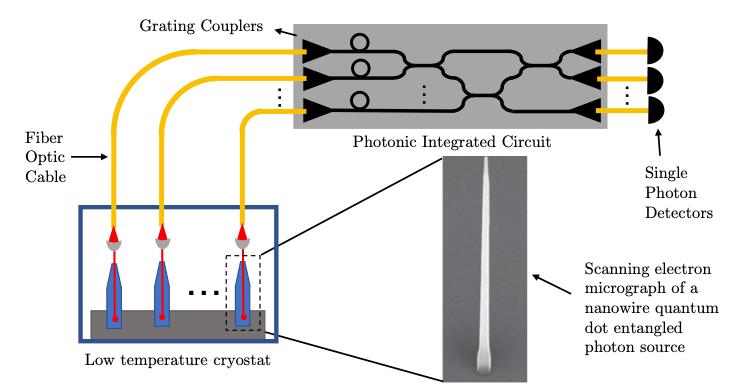
Photonic Quantum Processor
Photonic quantum processors based on integrated quantum photonic circuits require entangled photon pairs to perform quantum computations. However, current state-of-the-art technologies utilize probabilistic entangled photon sources with limited pair-extraction efficiencies, negatively affecting the computation speed. This project aims to boost the speed of on-chip quantum operations by using bright, on-demand entangled photon sources with an […]
April 24, 2023

Spin Generation and High-Frequency Detection via the Quantum Nonlinear Anomalous Hall Effect in Weyl Semimetals
In magnetic conductors, the passage of current yields an electric field in the transverse direction even without an external magnetic field – this is known as the anomalous Hall effect (AHE). This effect can act as a convenient probe of spin ordering, magnetic textures, spin-orbit coupling, and band topology in solids, and can be further […]
April 19, 2023
